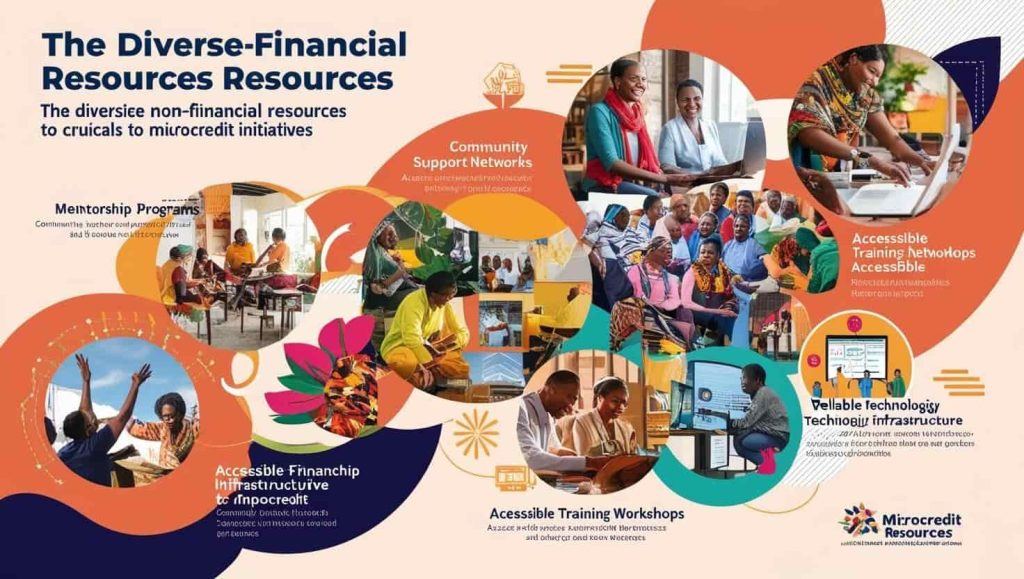
The Non-Financial Resources That Play a Vital Role in Supporting the Success of Microcredit Initiatives
Microcredit loans provide essential financial support to entrepreneurs in underserved communities, enabling them to secure the capital needed to launch or expand their businesses. However, financial resources alone are insufficient to guarantee success. Non-financial resources, particularly mentorship and networking, play a crucial role in ensuring the sustainability and growth of businesses supported by microcredit.
Mentorship: A Foundation for Entrepreneurial Success
Mentorship equips entrepreneurs with critical knowledge, practical skills, and invaluable insights. Mentors guide borrowers in navigating challenges, making informed decisions, and managing resources efficiently. Specific benefits of mentorship include:
- Enhanced Financial Management: Mentors help entrepreneurs develop sound budgeting and accounting practices.
- Strategic Planning: By assisting in the creation of robust business plans and marketing strategies, mentors ensure that entrepreneurs maximize the impact of their loans.
- Confidence and Innovation: Mentorship fosters problem-solving skills and encourages innovative thinking, enabling entrepreneurs to adapt to market dynamics effectively.
For example, VETLEP connects borrowers with experienced professionals who offer tailored advice on managing cash flow and responding to market changes. As Peavler (2021) aptly states, mentors act as “sounding boards,” helping entrepreneurs refine their ideas and make strategic choices.
Networking: Building Bridges to Opportunities
Networking facilitates connections with industry leaders, peers, and potential customers, creating a dynamic ecosystem for business success. Key benefits of networking include:
- Collaborative Opportunities: Entrepreneurs can share experiences, gain insights, and explore partnerships through networking events.
- Access to Resources: Strong networks provide access to affordable suppliers, reliable distributors, and new markets.
- Increased Visibility: Networking opens doors to funding opportunities and innovations, boosting business growth.
VETLEP enhances networking opportunities by organizing workshops and forums, fostering collaboration among entrepreneurs. Gitman and Zutter (2018) highlight that professional networks significantly expand access to resources and markets, strengthening the foundation for sustainable growth.
Fostering Economic Development Through Collaboration
Mentorship and networking contribute not only to individual success but also to broader economic development. Successful entrepreneurs create jobs, inspire others, and strengthen local economies. As Jones and George (2021) emphasize, entrepreneurial networks promote stable and resilient communities.
At VETLEP, we are committed to combining financial support with mentorship and networking opportunities, fostering a holistic approach to entrepreneurial empowerment. By integrating these vital resources, we aim to build an inclusive and prosperous entrepreneurial ecosystem, driving economic development and poverty alleviation in underserved communities.
References
- Bangs, D. H. (2021). A Complete Guide to Financial Management for Small Business. Entrepreneur Press.
- Barrow, C., & Barrow, P. (2019). The Business Plan Workbook. Kogan Page.
- Clarke, M. (2018). Entrepreneurial Finance and Accounting for High-Tech Companies. Cambridge University Press.
- Gitman, L. J., & Zutter, C. J. (2018). Principles of Managerial Finance. Pearson.
- Jones, G. R., & George, J. M. (2021). Essentials of Contemporary Management. McGraw-Hill Education.
- Peavler, R. (2021). Business Budgeting for Small Enterprises. Routledge.
- Tracy, J. A. (2022). Accounting for Dummies. Wiley.



